Zoos: Are They Ethical? My Collage for LMAC 135
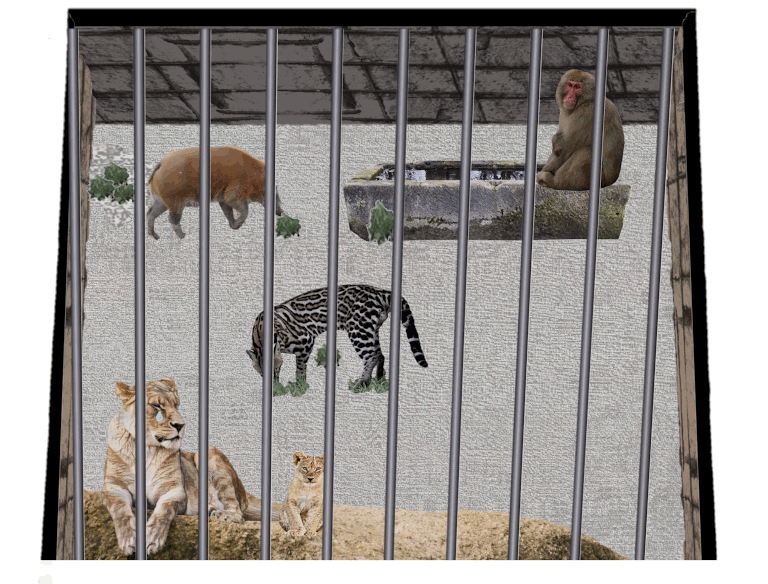
When I saw @shaka's striking picture of a lion sitting peacefully on a rock, I imagined the animal had to have been in a zoo when the photo was snapped.
@shaka's picture:
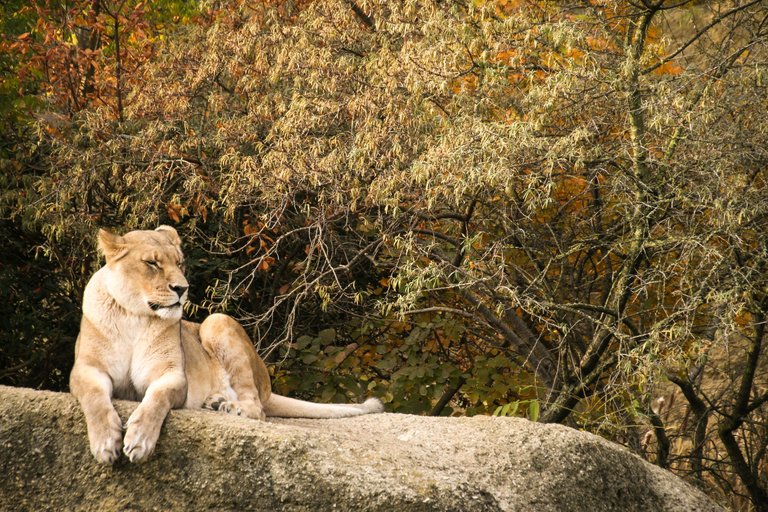
Years ago my husband and I would go to a zoo whenever we visited a new city. Then it hit me that zoos were really sad places and I decided never to support the institution again. We'd go to the movies, or visit museums (lively ones) instead.
Are zoos ethical? Is the idea of a zoo a concept that has grown old with time, and heightened awareness? I'll look at the issue, briefly, in my blog today.
Zoos: Ethical, or Not?
Most of us have seen at least one iteration of Planet of the Apes. If nothing else, this series of movies gives us pause. By turning the tables on the caged species, we gain an enhanced perspective on the ethics of caging for the sake of caging.
An egregious example of bad zoo behavior (in my opinion) might be the episode at the Copenhagen Zoo some years ago when a young giraffe was killed because he represented a common gene pool. He was useless for breeding, in the minds of the zookeepers. Not only did they kill the giraffe, but they dissected him publicly for the education of children.
Giraffes at the Copenhagen Zoo
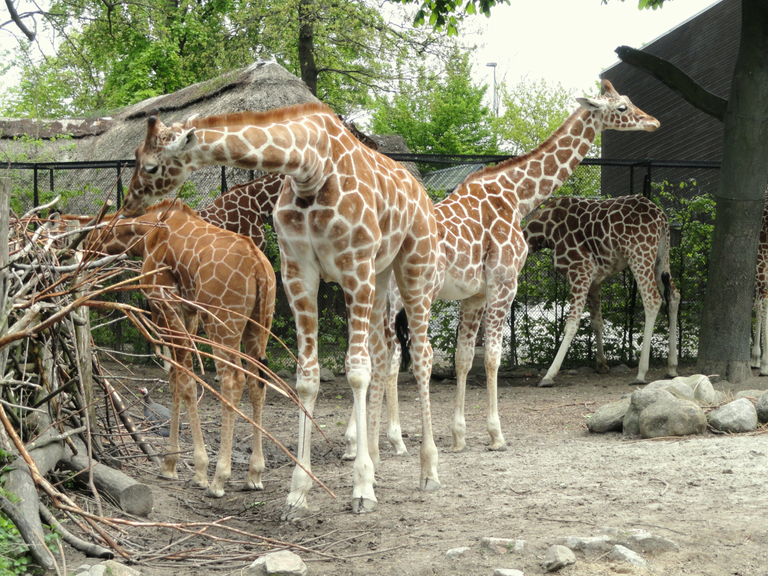
Credit: daderot. Used under 1.0 license.
Most zoos would not do what the Copenhagen Zoo did, but even the best zoos state as a worthy purpose, the conservation and breeding of animals, especially endangered species. I read several articles that reasonably discuss the merits of zoos and the potential ethical problem with them.
The existence of zoos is justified often by citing the role these play in education and conservation. It is suggested that if people know more about animals they will empathize with them and be interested in protecting them. This indirectly supports the conservation goal of zoos.
The Association of Zoos and Aquariums, for example, states:
AZA-accredited zoos and aquariums play a vital role in educating over 180 million visitors, including 51 million students, each year, about wild animals, their habitats, their related conservation issues, and the ways in which they can contribute to their preservation. Over the past ten years, AZA-accredited institutions have also trained more than 400,000 teachers with award-winning and proven science curricula.
Zebra Enclosure, San Diego Zoo, USA
Credit: Abujoy. Used under CC.3.0 license This zoo is accredited by the AZA.
An article published by the American Veterinary Medical Association (AVMA) asks the question: Is it ethical to keep animals in zoos? The answer provided in the article is, only if conservation and animal welfare are the focus. This very thoughtful article asks if it is ethical to cage a wild animal for entertainment or educational purposes. The article quotes Michael Hutchins, PhD, past director and William Conway Chair of the Department of Conservation and Science for the American Zoo and Aquarium Association. Dr. Hutchins states (2002):"Conservation alone is not enough to justify the existence of zoos." Dr. Hutchins adds, "A strong commitment to individual animal welfare is equally important."
Baby Giraffe, Birmingham Zoo, Alabama, USA
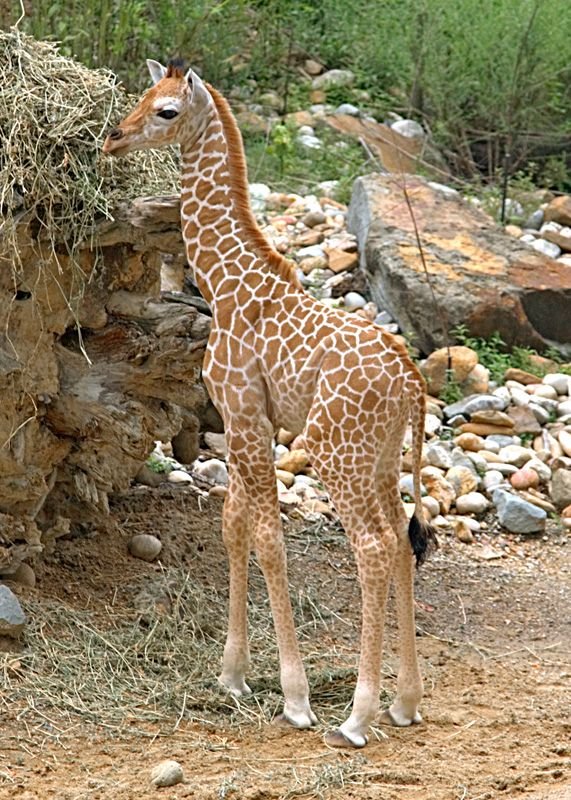
Credit: Alby Headrick, Birmingham Zoo. Used under CC 2.0 license.
Some arguments against zoos (From the Animals of the Pacific Northwest blog):
- "Even with enrichment activities, complex exhibits that attempt to mimic the animal’s natural habitat, or even larger safaris, animals in confinement can suffer from boredom and stress and may develop physical tics".
- "One reason why some zoo animals develop zoochosis is the size of their exhibit. In the wild, polar bears, for example, have been known to have a home range of 31,000 square miles".
- "Intergenerational and familial bonds are broken when individual animals are sent to other zoos, a practice that’s sometimes done in the Species Survival Plan Program to encourage mating and genetic diversity in the species".
My Take on the Pros and Cons:
If we look at the arguments for having zoos, they really boil down to one principle: It's good for us to have them there. We learn more about the wild animals. Breeding the animals encourages ecological diversity (good for us, on this planet). When it comes to caring for individual animals, that really isn't the goal. The happiness of the individual animals is sacrificed for the greater good. Whose good?
My Collage for LMAC 135
I want to begin by thanking my fellow artists who contributed photos to the LMAC Image Library, LIL:
@seckorama: the African Pig
@muelli: the Floor
@quantumg: the Tear
@mballesteros: the Ocelot
@onyechi: the Walls
I also borrowed images from Pixabay:
- From mlaranda
The Lion Cub - From anaterate
The Trough - From santa3
The Ape - From perlinator
The Bars
I had trouble getting the cage to look like a room but consulted a Youtube video about making walls, and that helped.
As always, I used GIMP, Paint and Paint 3d to manipulate the pictures and frames.
LMAC, the Community, the Contest and the Library
I don't compete in the LMAC contest, but I do make a collage just about every week. It is a rewarding experience. Voting for this week's contest winner is going on now. Everyone can join in and vote here. Thursday we begin again, with round #136. Many of the artists have borrowed images from our image library, LIL. This is a unique Hive resource. All Hiveans may contribute to it and may borrow from it. Procedures are spelled out here.
I want to thank @shaka, community founder and leader, the LMAC team, collage creators, and this week, especially @balte, who has contributed 50 Hive to the prize pool.
I wish all my readers a peaceful, healthy day.
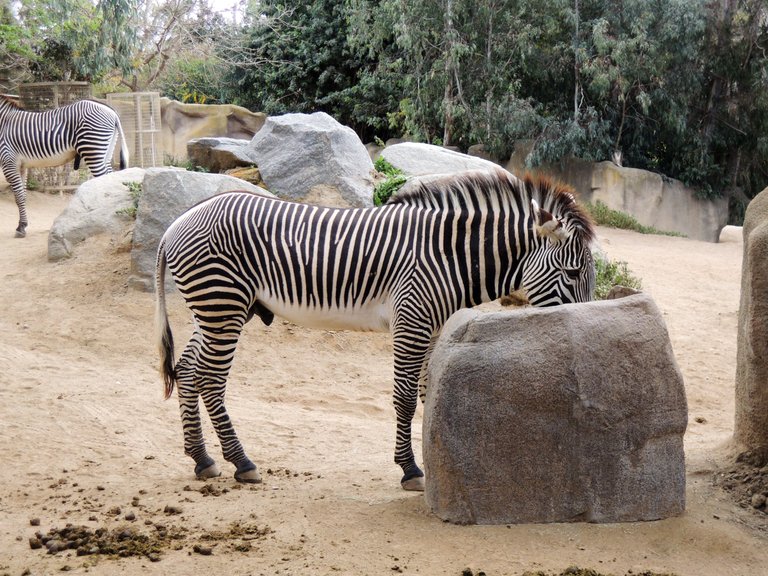
Your content has been voted as a part of Encouragement program. Keep up the good work!
Use Ecency daily to boost your growth on platform!
Support Ecency
Vote for new Proposal
Delegate HP and earn more
Thanks for using my LIL image. Yes, I think the Zoos are problematic nowadays, especial the old ones with small cages, but it's hard to change minds of people ... from the other side, I saw the wild animals when I was a child but I feel the pain from them when I look directly to their eyes ...
I think nature films can accomplish this. What a price the animals pay just so that we can learn to be compassionate. It is a complex issue, for sure.
Thank you for contributing such great images to LIL. I often find use for them. And thank you for commenting.
I once saw a jaguar (and other creatures) in a cage. Such a powerful wild creature all caged up was not good. The open air zoos are a step up but I imagine that constraining animals who prefer large hunting range is not a good idea.
On a trip to Thailand I visited a 'sanctuary' and bathed an elephant (until he decided to be naughty and grab a person's leg to knock them over playfully). We learned how to make soap out of some tree to bathe them and learned a few facts about how they live and behave. Supposedly these were rescued animals, but I couldn't be certain, of course. It's a tricky situation because there are some animals that probably do need the help, and the funds to receive that help, so it's difficult to say whether this sanctuary was a good idea.
Very thoughtful article @agmoore!
Thank you! Of course, animal rescue is another matter. If there is a preserve set aside for rescued animals that cannot be returned to the wild, that's great. I think the metric should be, who benefits? Is there money to be made? Are the animals exploited for human entertainment/profit, or does the preserve exist solely for the animal's welfare. As you say, hard to determine but the ultimate test.
Thanks for stopping by. I love the picture :)
It is a difficult topic because of the multiple angles- social, cultural, political, scientific, educational, financial, and so on. Our attitudes in the western world have changed and continue to evolve. In other countries, not so much. This is why we need to have the discussion from time to time.
Being around the elephants was interesting. They're like big babies. Another group nearby actually had a baby elephant that was playing by sliding down a hill with his front legs spread out. Clever creatures!
It's a tricky one. These days mass extinction events seem to lend a pro to zoos, enabling them to 'save' the gene pool of endangered animals. Education is also important - yeah children a love of animals and personal experience with them and they're more likely to be am advocate for them.
Zoo-m out, pun intended, and it's another example of how fucked up humanity is. We are okay with eating meat, having no consideration for how, say, cows are treated (see @fermentedphil beautiful cow 🐮 post this week) but can cry that zoos are important to save animals? How about we save them in our own fields? And plains, and oceans, and savannah, and tundra...
But. Still. There's a lot of good being done by some zoos from a conservation and animal advocacy perspective.
My husband grew up running round Whipsnade as a child, after hours with the gates shut as his grandfather lived in the managers cottage inside the grounds and was caretaker. So he has very strong, fond memories of zoos, a fierce love of animals, and a resistance to most zoos whilst appreciating 'the good ones'.
Funny enough we are going to Melbourne Zoo on Sunday. Haven't been in years. A little reluctant. They do swap the larger animals with Werribee Open Range zoo, which is good... The African big animals get a vast range there. But still, it's a complex thing, is it not, to zoo or not to zoo.
I'll probably have more to say about it next week!
I used to love going to zoos. That was one of the things my husband and I had in common--a love of animals. However, once I had the sense of them as sad places, I couldn't do it anymore. Everything in its time.
I also don't feel very good about eating meat. I never choose it or buy it for myself. But if my husband is eating it, I steal a piece, guiltily.
We are not perfect. We try to live conscientiously in a cruel world, but it's not a straight path. One thing I know for sure, lecturing people won't change minds, so I try stuff like this. Cute collages and gentle arguments.
Certainly, the culture has come a long way from my childhood (back in the 50s!!) when all my aunts competed to have the biggest and the best fur stoles. We are making progress. Now we have the Nonhuman Rights Project, which has litigated the rights of confined animals in court.
I hope you enjoy your trip. It won't help the animals if you feel miserable :))
Thank so much for stopping by. I very much appreciated your description of 'running round Whipsnade'. I'm a country girl myself. My playground was a forest, a stream and mountain :)
That sounds just divine. WHere was that, then?
Yes, it's more complex than simple yes/no arguments, that's for sure. Gentle and open is the way to be.
Historically, zoos have been places of abuse, but I think much has changed, especially in the west, where there's more regulation and accountabiliy, and, perhaps, much more funding. I guess we can ethically justify anything, right? I WILL enjoy Sunday - it'll be nice to spend time with family for a change. Covid's been constantly keeping us apart.
I guess we can ethically justify anything, right?
😇
Hudson River Valley, in the foothills of an Appalachian range, the Shawangunk mountains. It was 'divine'. So close to nature it became a part of me. And yet, it was brutal. Very difficult circumstances. My only comforts were the forest, the stream and the mountain :))
For me, nothing is more important. Enjoy every moment.
Oh gosh. I hear so much about that area. The biodiversity there sounds extraordinary. I've heard so much about the medicinal plants in the area, the folk lore, the music, the mountain folk. I have never been to America but boy would I like to visit there.
I am sorry about your hardship. I find it so incredible how often nature holds space for us, gives us peace, calms our fraught nervous system, teaches and raises us. It certainly seems like it was family for you - a solace when life's brutality was too much.
You have a heart my friend. And yes, you would love it. Appalachians are one of the oldest ranges in the world. Quite primitive, and beautiful.
This is my exact argument. Why not use some of the lands we essentially "stole" from these animals so that they can rewild it? It is a shame that we can just take land and not think about the loss of life. For example, here where I live we have vast amounts of fields that are used for canola, corn, and wheat. But people cry about the rainforests that are being cut down. Meanwhile, our rainforests were cut down about 50 years ago without a tear.
My two cents about zoos, especially seeing all the African animals, they are used to vast grassy planes. I cannot even begin to think how they feel in smallish enclosures. I remember a story about apes in an enclosure. They put too many inside for in the wild their numbers per square meter would have been much less. Some of the apes, if I remember correctly, died and got sick as a kind of response to the unnatural number of them so close together.
We think we know so much, but in our attempts to be smart we are actually very stupid.
Sorry for the unasked for two cents opinion. 😅😅
No need to apologise - I think we all agree!
Thanks for your contribution to the STEMsocial community. Feel free to join us on discord to get to know the rest of us!
Please consider delegating to the @stemsocial account (85% of the curation rewards are returned).
You may also include @stemsocial as a beneficiary of the rewards of this post to get a stronger support.
Thank you very, very much @stemsocial. This endorsement is much appreciated.
What's a lively museum?! I'm imagining Night at the Museum !
I haven't read anything about this debate but I've thought about it. One of the thoughts I've had is that exposure to animals (in zoos), usually as children, deepens our love for them, I would think (with whatever positive benefits that might bring to the animal kingdom as a whole). There's a reason people are calling for greater representation of minorities in, say, movies: exposure to these minorities creates a positive attitude toward them. Without zoos, most of our exposure to animals would be in the form of food and a small variety of pets. Would that be good?
Also, if zoos go the way of the circus, will pets go the way of the zoo?
My husband is not very interested in passively walking around looking at things hanging on a wall. He was captivated by the Atomic Testing Museum in Las Vegas though. That was a rather "lively* exhibit. Cradle of Aviation Museum, on Long Island is another example. These are relatively 'lively' (maybe dynamic would be more appropriate) museums :)
As for using animals to elicit compassion from children: I think David Attenborough's documentaries would serve that purpose nicely and no animals would have to suffer. It seems rather perverse to impose suffering on non human species just so humans can learn compassion. Perhaps when children see animals in cages they learn something else. Perhaps they learn that we can impose suffering on others and that's OK. Perhaps they learn to discount the value of lives that are not human.
Looking into the eyes of a caged jaguar may teach us to have interest in the animal. It may also teach us to tolerate conditions imposed on animals that we would find unacceptable for ourselves.
Thank you for visiting. As always, you response to the prompt is interesting.
For some reason reading this immediately brought to mind the following cartoon by Gary Larson. It was inspired when his editor visited him one day and was talking to Larson's wife and Larson suddenly exclaimed, 'I just thought of an idea for a cartoon'!
😂😂
Certainly zoos can be very depressing places, it is a matter of putting yourself in the place of each one of the caged animals, because nobody would like to be locked up or limited to a small extension of land. As mentioned in some of the articles you quoted, zoos become places for the protection of those species that are more vulnerable to extinction, even these places can serve as genetic banks, the problem is that many times it is very difficult to replicate the proper habitat of each animal, there are even zoos that do not even have how to take good care of the animals. It also happens that many times the business behind them is observed, this is very unfortunate.
On the other hand, there are also cases where the captivity of certain species is necessary, an example can be seen in Colombia, where drug traffickers brought a lot of exotic species from Africa such as hippos. After the fall of drug trafficker Pablo Escobar, the hippopotamuses escaped and adapted to the environmental conditions of Colombia, the worst thing was that they reproduced in large numbers (among the family) and damaged their genetics. Now the authorities do not know what to do with them, they cannot return them to Africa because they are no longer species that belong to that continent, so they can carry new diseases or damage the genetics of the species there and put them at risk of extinction, in Colombia they became invasive species because they could not move them all to the zoos, being the size and aggressiveness one of the causes that complicate their transfer, not to mention the enormous costs that this would imply. If people would become aware and avoid indiscriminate hunting, destruction of ecosystems and all those things that endanger animals, then zoos would not have a valid reason to exist, since there would be no species to preserve. Excellent analysis @agmoore, it has been a pleasure to read you.
I am honored by your visit, @abneagro. Your sympathy for the animals, and your respect for all living things is inspiring.
I'm stunned by the hippopotamus escapade in Colombia. What selfish, irresponsible, ignorant behavior. I guess in a way this is an example of how species evolve. Whether continents shift, ships travel or people deliberately transport animals, nature is not fixed. We have to adapt as species adapt.
Thank you for this most interesting response to my blog. As always, I learn from you. Have a peaceful day. I look forward to reading your next blog.
That's right, many species manage to adapt perfectly to other very different places. Hippos in Colombia have found a paradise, since they have food and rain all year round, as well as large water reserves and, above all, no predators. In Africa, where they originate, these animals have lions as predators, but in Colombia they live like kings because they have no natural controllers. There are many negative aspects that this brings to the ecosystems of Colombia, the main one is the competition and displacement of the native species of that country (Colombia).
I was looking for a video in English where they talk a little bit about these animals that nowadays are becoming an invasive species in Colombia, I will leave the video here so you can know a little more about this case.
I hope you also have a nice day @agmoore, greetings :)
That is amazing. It seems there is no happy solution to this problem. I have read some more about the subject since watching the video. It seems the government has declared hippos to be an invasive species (June '22), and the remedy may include hunting them down and killing them.
What I think of when I read this (besides the unhappy outcome for the animals) is the economic resources diverted to deal with the hippos. There is already great need in Colombia. That money could be used for education, healthcare and other programs to help the poor.
Thank you for sharing the video with me. I will post it on Twitter, if you don't mind.
Congratulations @agmoore! You have completed the following achievement on the Hive blockchain and have been rewarded with new badge(s):
Your next target is to reach 23000 upvotes.
You can view your badges on your board and compare yourself to others in the Ranking
If you no longer want to receive notifications, reply to this comment with the word
STOPCheck out the last post from @hivebuzz:
Support the HiveBuzz project. Vote for our proposal!